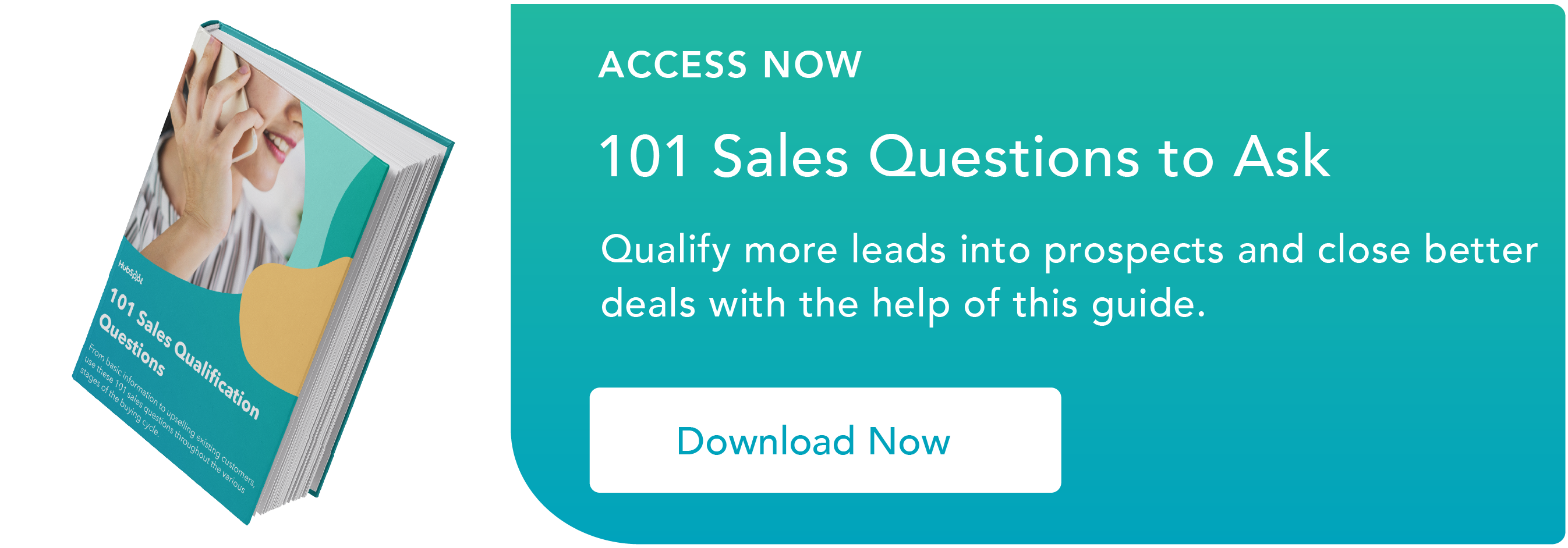Sales qualificationis a game of open-ended questions. Unless you ask the right questions, you won't uncover the right needs or understand the right problems to solve. Not having that information could cost you the deal from the very beginning.
But there's an art to asking销售资格questions. Which is why I'd like to share these tips for asking more effective open-ended questions that quickly qualify and disqualify prospects. Keep reading to find out what those questions are, but first, let’s go over what makes a good question and how you can create a great line of questioning.
What makes a good open-ended sales question?
Open-ended questions have an edge over close-ended questions because they don’t box your prospect into answering with a simple “yes” or “no.”
A close-ended question is something like, “Is your business in so-and-so industry?”An open-ended question is something like, “I see your business is in so-and-so industry. What has been your biggest challenge when keeping up with your competition this year?”
A great open-ended question will ensure your prospect answers with enough detail that you can craft a follow-up that’ll get you closer to发现潜在客户的需求.
让我们以先前的问题为例。
- 最初的问题: “I see your business is in so-and-so industry. What has been your biggest challenge when keeping up with your competition this year?”
- Follow-up question:“I see. How do you plan to tackle [competitor’s] increasing market share next quarter?”
- Final question:“这是一个很好的计划!您的团队很小,因此启动该计划可能会具有挑战性。您将利用哪些类型的工具成功执行计划?”
How to Create a Good Line of Questioning
When you first hop on adiscovery callwith a prospect, it might be tempting to jump to the questions you know will give you a clear indication of the prospect’s interest.
While being bold and blunt might work for you — especially if that’s your preferredselling style— it’s important to phase the tough questions in gradually. The more your prospects converse with you, the more comfortable they’ll feel answering questions about their needs and roadblocks.
Here are some tips for creating a great line of questioning.
1. Start with general open-ended questions.
My first tip is to start with really general questions. Below, I suggest starting with“May I ask you some questions about your business?”Why? This gives your prospect the opportunity to shut the door — or keep it open.
In some situations, it’s better than starting with“Could you tell me about your business?”That question presumes that your lead wants to speak with you. The exception is, of course, when the lead has submitted a form, clearly indicating interest. You can ask them straight away to tell you more about their business.
2. Gauge the leads’ interest as they answer your initial questions.
Read their tone, facial expression, and body language (if the meeting is over video or in person). Do they seem genuinely interested, or are they simply answering questions because you’re asking them?
Based on your previous research of the prospect’s company and their interest at the beginning, you can decide whether to cut the qualification process short or continue onward.
3. Ask early on how the company evaluates new products and services.
There’s nothing worse than getting far along and then finding out that your prospect uses certain criteria to evaluate new services. And that you don’t meet those criteria. Place this question after asking about their goals and more closely evaluating their needs.
4.始终询问预算。
没有人喜欢谈论钱,但在许多情况下s, whether a company chooses to purchase from you depends on the budget. Ask whenever it feels most appropriate, depending on the tone of the conversation and the prospects’ demonstrated interest.
5. Close by establishing follow-up steps.
Never close a sales call without establishing next steps. After you’ve asked enough questions that you feel a next step is necessary, be sure to verbally say that you’ll be emailing them on X date or sending the contract along for their perusal by the end of the day.
Open-Ended Questions for Sales
- May I ask you some questions about your business?
- 你能告诉我你的业务吗?
- You specialize in X. Why did you choose that niche?
- Were your telephone transmissions of data fast enough?
- What are your goals for the next [3, 6, or 12] months?
- 您的老板希望在明年取得什么成就?
- 您的公司在购买前如何评估新产bob全站app品或服务?
- Why would you commit time and resources to something that's low to medium priority?
- Tell me about your average day. How would this solution impact your daily work?
- What's holding your team back from reaching your goals?
- 预算是以前解决此问题的障碍吗?
- 为什么现在对您来说是优先事项?
- Who are you doing business with now? Why did you choose that vendor?
- Is there anyone else you think I should speak with?
- What is the business problem you're trying to solve?
- What are the priorities for your business/team this quarter?
- What are your biggest pain points?
- What events are you attending this year?
- Where do you see the biggest opportunities for growth?
- 什么时候可以跟进的好日期?
B2B Sales Questions
1. May I ask you some questions about your business?
在某些情况下,您可以理解您在那里收集信息。在其他情况下,通过要求允许提出问题的尊重是适当的。
这可能是一个修辞问题,但无论如何都值得一提。
2.您能告诉我您的业务吗?
广泛的开放式销售问题是开始收集信息的好方法。他们使您的潜在客户放心,因为它们允许任何类型的回应。
This is a non-threatening way to begin. Listen to what your prospect says and what they omit. Both will suggest areas to explore in greater depth, such as,“您能告诉我更多关于缺勤如何影响您的底线的信息吗?”
3. You specialize in X. Why did you choose that niche?
任何好的面试官都知道,最合乎逻辑的问题来源来自受访者的回答。通过聆听关键词,将您的问题与回答相吻合。
Example question role play:
- [Prospect]"I own six flower shops that specialize in large event decorating."
- [Salesperson]"You specialize in large events. Why did you choose that niche?"
- [Prospect]“下开销。我可以在仓库而不是店面工作。我不必保持易腐烂的库存;我只有在需要时大量订购,这可以使我的价格降低。”
- [Salesperson]"What do you mean by large events? How would you define that? What are the minimum orders?"
4. Were your telephone transmissions of data fast enough?
Use industry jargon when appropriate. If you're talking to an expert, show your expertise by sounding as if you've spent your whole life in his industry. If you're talking to a neophyte, don't embarrass them with your technical jargon. This is especially true in retail sales, where customers look to salespeople for guidance, not confusion.
Every field has its own jargon, and you may be an expert in yours; however, your prospect may not be as well versed as you. Avoid questions that will confuse your prospect, or worse, make him feel inferior.
- Example questionnotto ask:“Was the baud rate of your present system satisfactory?”
- Example question to ask:“Were your telephone transmissions of data fast enough?”
5.下一个[3、6或12个月]的目标是什么?
Keep your questions simple. If you want useful answers, ask useful questions. Convoluted or two-part questions should be avoided. Ask straightforward questions that cover one topic at a time. It’s best to ask for one answer at a time.
- Example question not to ask: “What do you think about the marketing plan and will the new ad campaign confuse customers and would that confusion actually be beneficial to the long-term product growth?”
这不会产生一个有意义的答案。如果你ask a two-part question, people tend to either answer the second part only or only the part they were interested in or felt safe with. Ask one question at a time!
6. What does your boss hope to accomplish in the next year?
Use a logical sequence for your questions. Prospects like to know where your questions are headed. If they can't tell, they may suspect you're manipulating them. By following keywords and asking sales questions in a logical order, you will keep your intent clear and build trust.
7. How does your company evaluate new products or services before buying?
Start off safe, general, and non-threatening. That means asking open-ended questions that don't touch on sensitive subjects. Later, after you have built up trust — and when it is appropriate — you can ask about financial ability, business stability, credit rating ... anything relevant.
8.为什么要将时间和资源投入到中等优先级的东西?bob体育苹果系统下载安装
证明对您的前景的敏感问题是合理的。毕竟,他们有权知道您为什么要问 - 但是话又说回来,不要害怕问您的潜在客户棘手的问题。
If a prospect has multiple agenda items for your 30-minute meeting and they start with low-priority action items, don't be afraid to get to the point.
Example question role play:
- [Prospect]"Let's start with item number one on the agenda."
- [Salesperson]"Is that the most important item on the list?"
- [Prospect]"I'd say it's low to medium priority for me and the team."
- [Salesperson]“我们今天只有30分钟的时间讨论潜在的解决方案。为什么要将时间和资源投入到中等优先级的东西上?我们可以首先从高优先级的项目开始,从而最大限度地利用您的时间和团队的时间。”bob体育苹果系统下载安装
9. Tell me about your average day. How would this solution impact your daily work?
许多前景不会知道所有y的好处our product or service. Therefore, don't ask them what benefits they are looking for; tell them what benefits will be theirs! When you ask them what they want, have them generalize about the improvements they would like to see.
如果你were to ask a prospect,“您如何期望CRM简化您的数据保存工作?”you may make them feel ignorant. They have never owned or used a CRM, so they probably have no idea of all its uses. It would be better to ask what general improvements they would like to see.
- Example question: “What are some of the data-keeping duties in the office that you find tedious and time-consuming?”
This will free the prospect of needing CRM knowledge to answer the question. They’ll answer: “Customer information, duplicate data sets, website activity,” and so on. You'll then have the information you need to recommend the hardware and software.
10. What's holding your team back from reaching your goals?
请记住,您是公司和客户之间的联络;bob全站app您是顾问。因此,您想以最大的努力来质疑您的潜在客户的最大信息。为此,请减轻问题的压力。
Ask them in a relaxed tone of voice. Give time for the answers, even if it means sitting quietly and waiting. Don’t be in a hurry to get to your next appointment. The investment you make in time now will pay off handsomely when the prospect evolves into an annuity.
11.预算以前解决了这个问题吗?
Good transitions are a crucial skill in a salesperson's conversational arsenal. If you veer from, "您过去如何尝试解决这个问题?" to"And what's your budget for this solution?",你在如何quic风险给你的鞭子的前景kly you took the conversation from their pain points to your budgetary concerns.
Instead, work in a transitional question. This bridges the gap between solution sourcing and the prospect's current budget. It keeps them feeling supported while giving you the information you need about the feasibility of their budget.
12. Why is this a priority for you now?
The worst thing that could happen to a salesperson during this part of the process is they ask a question and get a one-word answer in response.
- Example questions not to ask:"Are you happy with your current vendor?" "Did your boss support that decision?"or"Is this a priority for you now?"
Instead, frame your questions in a more exploratory way.
- Example questions:"Tell me about your experience with your current vendor." "How did your boss support or not support this decision?"and"Why is this a priority for you now?"
These small tweaks turn dead-end questions into new avenues for discovery.
13. Who are you doing business with now? Why did you choose that vendor?
没有得到您需要的答案?问,"Why?"For example, if you ask a prospect,"Have you tried to solve this problem in the past?"and they reply with,"Yes,"respond by asking,"Why didn't it work?"
"Why" questions can turn simple answers into rich ones that keep your conversation going. That way, you get the information you need to help your prospect and determine if they're the right fit.
14. Is there anyone else you think I should speak with?
In the discovery or qualifying process, it's important to keep questions focused on benefiting and solving for the prospect you're speaking with at the moment.
避免询问潜在客户的痛点是如何与另一个部门的痛点息息相关的。这是二手信息,它将潜在客户的重点转移到他们的同事,而不是手头问题如何影响他们。
Instead, at the end of your questioning, ask if there's anyone else you should speak with.
- Example question: "Is there anyone else this challenge affects?"
If the answer to those questions is,"Yes, you should speak to Accounting,"politely ask,"Would you mind introducing me to the right person in that department?"
This allows you to ask fresh questions, and get honest, first-hand responses from other stakeholders at the company.
15. What is the business problem you're trying to solve?
When the qualifying questions have gone well, your prospect is putty in your hands, and you know they know it's a good fit, it's tempting to make your pitch, but don't.
您有一个镜头来进行良好的球场,并且不想通过匆匆忙忙地吹出它。感谢他们的时间,给他们您的下一步和时间表,并花几天时间(或至少要几个小时),制定一种演示或策略,以深思熟虑地解决他们的痛点并提出解决方案。
Qualifying questions are arguably one of the most important parts of the sales process. They tell you if you can help your prospect, and provide the intelligence you need to know exactly how to help them. Don't rush it, be thoughtful in your questioning, and reap the benefits of a question well-asked.
16. What are the priorities for your business/team this quarter?
By understanding what your prospect and their team is focused on for the next few months, you better understand how to help them — or at least what question to ask next.
If they answer,"Our team is focused on hiring, this quarter,"您为招聘经理提供教练服务,您来了。如果您的潜在客户回答"We're really focused on becoming efficient with a small team,"您可能需要调整方法或下一个问题,以更好地了解它们是否适合您的教练服务。
17. What are your biggest pain points?
Understand what they're struggling with and you'll understand how you can help. Once they share their pain points, don't immediately reply with, "Well, our new product X can really help you there."
Instead, ask follow-up questions that seek to learn more. Never offer a solution before fully understanding the scope and nuance of the issue. For example, if your prospect says,"Our sales and marketing teams aren't communicating well,"follow up with,"Where would you say the communication barriers are?"
The more you learn, the better you can assist.
18. What events are you attending this year?
通过询问您的潜在客户在哪里投资时间和金钱,您将知道他们的优先事项在哪bob全站app里。如果您的潜在客户回答了他们的营销团队在今年秋天的三个中西部人力资源会议上设有摊位,那么您就会知道他们正在尝试扩大其区域覆盖范围,并在人力资源行业中发展其客户群。bob体育苹果系统下载安装这也意味着他们重视面对面的销售。
19. Where do you see the biggest opportunities for growth?
With this question, you’re giving the prospect ample room to share where their team or business can improve. This is especially a good question if you didn’t get the information you needed when you asked about the customer’s pain points. Plus, it phrases it in a way that positions the pain points as opportunities that can be leveraged for growth.
Your prospect may also answer this question in financial terms. They might say something like,“好吧,我们在上个季度未能达到收入目标,我看到有机会通过扩展到新市场来超越这些目标。”In that case, segue into pain points by asking about challenges their team could face.
20. When is a good date to follow up?
如果你don’t feel comfortable setting a follow-up date for the prospect, leave the option open by asking this question. I would highly recommend asking this question to prospects who’ve been proactive so far or who’ve shown genuine interest in the product, because they’ll easily set a date.
A prospect who’s not so sure might vacillate, and that could kill your deal before you can deliver your closing pitch. In that case, reword your question as follows:“Can I follow up with you on mm/dd?”If the date doesn’t work for them, prompt them to offer an alternative.
Use Open-Ended Sales Questions in Your Next Call
Asking open-ended questions is the key to qualifying prospects more quickly and efficiently. With the questions I’ve suggested above, you’ll be sure to determine whether a prospect is a good fit for your product and successfully close the deal.
Editor's note: This post was originally published in June 2014 and has been updated for comprehensiveness.
Originally published Oct 11, 2021 7:00:00 AM, updated October 11 2021
Topics:
Sales QualificationDon't forget to share this post!
Related Articles

![What a Client Intake Form Is & What It Should Look Like [Template]](http://www.eigoj.com/hubfs/CLIENT%20INTAKE%20FORM%20%281%29.jpg)

Expand Offer
ctaSales Plan Template
Get it now
![免费下载:101个销售资格问题[立即访问]](https://no-cache.hubspot.com/cta/default/53/e97d6603-b40e-4085-ad55-0074b7351ead.png)

